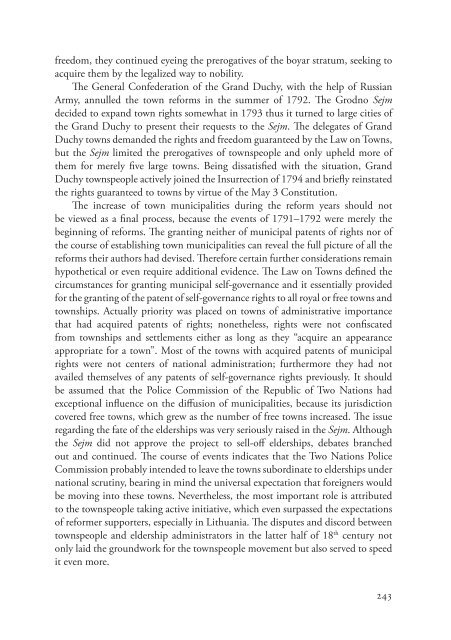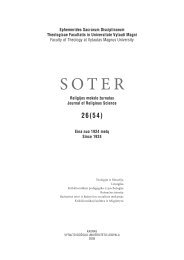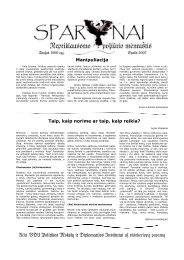Untitled - Vytauto Didžiojo universitetas
Untitled - Vytauto Didžiojo universitetas
Untitled - Vytauto Didžiojo universitetas
Create successful ePaper yourself
Turn your PDF publications into a flip-book with our unique Google optimized e-Paper software.
freedom, they continued eyeing the prerogatives of the boyar stratum, seeking to<br />
acquire them by the legalized way to nobility.<br />
The General Confederation of the Grand Duchy, with the help of Russian<br />
Army, annulled the town reforms in the summer of 1792. The Grodno Sejm<br />
decided to expand town rights somewhat in 1793 thus it turned to large cities of<br />
the Grand Duchy to present their requests to the Sejm. The delegates of Grand<br />
Duchy towns demanded the rights and freedom guaranteed by the Law on Towns,<br />
but the Sejm limited the prerogatives of townspeople and only upheld more of<br />
them for merely five large towns. Being dissatisfied with the situation, Grand<br />
Duchy townspeople actively joined the Insurrection of 1794 and briefly reinstated<br />
the rights guaranteed to towns by virtue of the May 3 Constitution.<br />
The increase of town municipalities during the reform years should not<br />
be viewed as a final process, because the events of 1791–1792 were merely the<br />
beginning of reforms. The granting neither of municipal patents of rights nor of<br />
the course of establishing town municipalities can reveal the full picture of all the<br />
reforms their authors had devised. Therefore certain further considerations remain<br />
hypothetical or even require additional evidence. The Law on Towns defined the<br />
circumstances for granting municipal self-governance and it essentially provided<br />
for the granting of the patent of self-governance rights to all royal or free towns and<br />
townships. Actually priority was placed on towns of administrative importance<br />
that had acquired patents of rights; nonetheless, rights were not confiscated<br />
from townships and settlements either as long as they “acquire an appearance<br />
appropriate for a town”. Most of the towns with acquired patents of municipal<br />
rights were not centers of national administration; furthermore they had not<br />
availed themselves of any patents of self-governance rights previously. It should<br />
be assumed that the Police Commission of the Republic of Two Nations had<br />
exceptional influence on the diffusion of municipalities, because its jurisdiction<br />
covered free towns, which grew as the number of free towns increased. The issue<br />
regarding the fate of the elderships was very seriously raised in the Sejm. Although<br />
the Sejm did not approve the project to sell-off elderships, debates branched<br />
out and continued. The course of events indicates that the Two Nations Police<br />
Commission probably intended to leave the towns subordinate to elderships under<br />
national scrutiny, bearing in mind the universal expectation that foreigners would<br />
be moving into these towns. Nevertheless, the most important role is attributed<br />
to the townspeople taking active initiative, which even surpassed the expectations<br />
of reformer supporters, especially in Lithuania. The disputes and discord between<br />
townspeople and eldership administrators in the latter half of 18 th century not<br />
only laid the groundwork for the townspeople movement but also served to speed<br />
it even more.<br />
243





